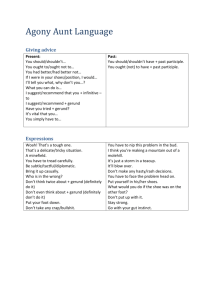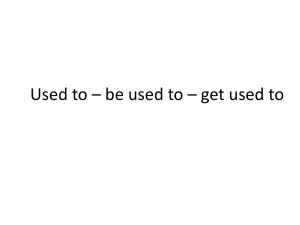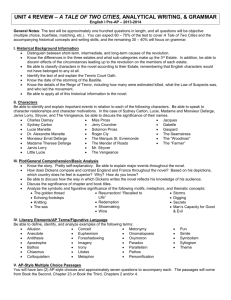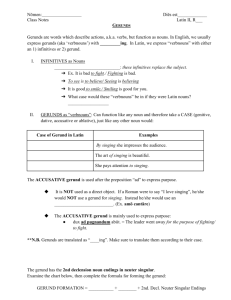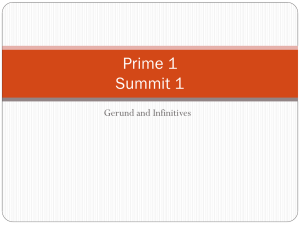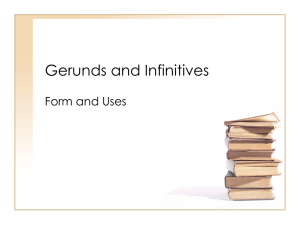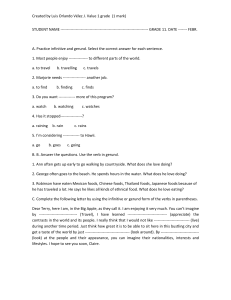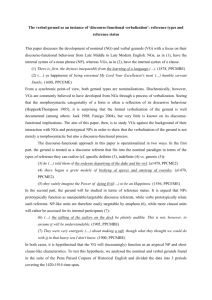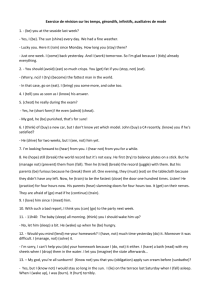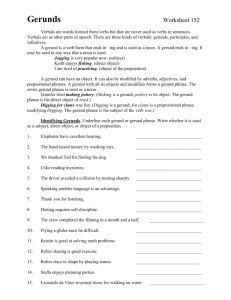Gerund after prepositions (verbs)
advertisement
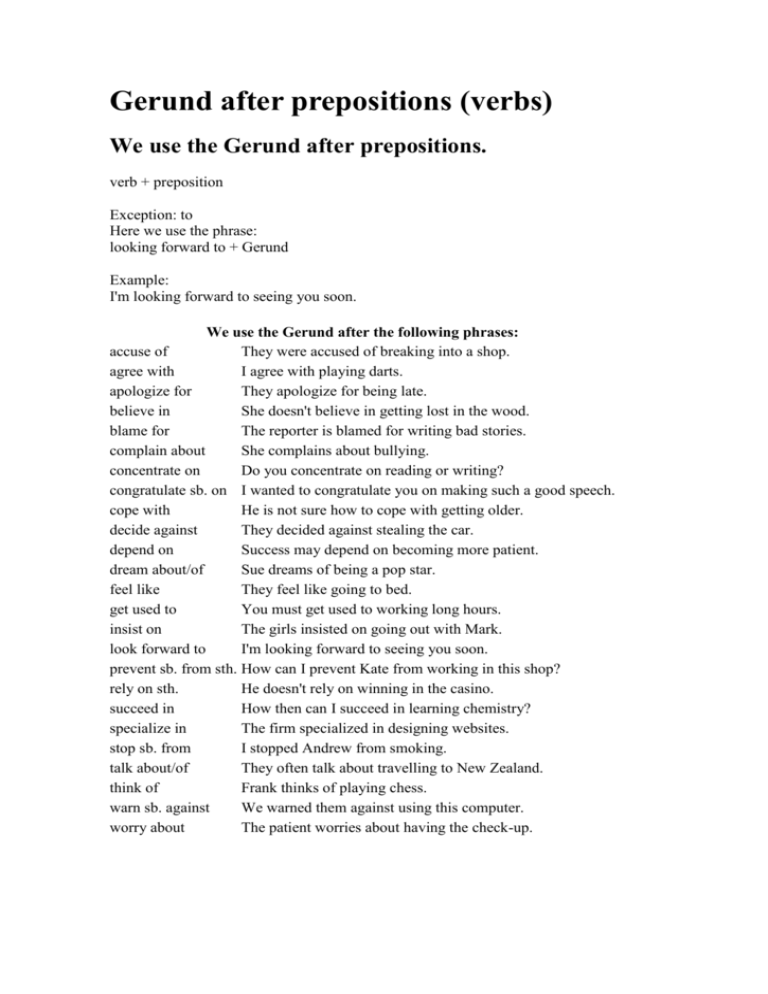
Gerund after prepositions (verbs) We use the Gerund after prepositions. verb + preposition Exception: to Here we use the phrase: looking forward to + Gerund Example: I'm looking forward to seeing you soon. We use the Gerund after the following phrases: accuse of They were accused of breaking into a shop. agree with I agree with playing darts. apologize for They apologize for being late. believe in She doesn't believe in getting lost in the wood. blame for The reporter is blamed for writing bad stories. complain about She complains about bullying. concentrate on Do you concentrate on reading or writing? congratulate sb. on I wanted to congratulate you on making such a good speech. cope with He is not sure how to cope with getting older. decide against They decided against stealing the car. depend on Success may depend on becoming more patient. dream about/of Sue dreams of being a pop star. feel like They feel like going to bed. get used to You must get used to working long hours. insist on The girls insisted on going out with Mark. look forward to I'm looking forward to seeing you soon. prevent sb. from sth. How can I prevent Kate from working in this shop? rely on sth. He doesn't rely on winning in the casino. succeed in How then can I succeed in learning chemistry? specialize in The firm specialized in designing websites. stop sb. from I stopped Andrew from smoking. talk about/of They often talk about travelling to New Zealand. think of Frank thinks of playing chess. warn sb. against We warned them against using this computer. worry about The patient worries about having the check-up. Example: He concentrates __ physics. Answer: He concentrates on physics. 1) My friend is good playing volleyball. 2) She complains bullying. 3) They are afraid losing the match. 4) She doesn't feel working on the computer. 5) We are looking forward 6) Laura dreams 7) Andrew apologized 8) Do you agree 9) The girls insisted 10) Edward thinks 1. 2. 3. 4. 5. 6. going out at the weekend. living on a small island. being late. staying in a foreign country? going out with Kerry. climbing trees this afternoon. Gregory decided on chicken instead ………………….(order/steak). I'm interested ………………….(watch/film) by Ken Loach. He apologised …………………….(be/late). I certainly can't blame you ……………………(not/want) to come. Magda's thinking ……………………………..(study/England). We are really very excited ………………………..(hike/Andes) this coming summer. 7. Simon isn't really used……………………………….. (walk/work). 8. We thanked them…………………………. (drive/us/home) after the football game. 9. Could you please tell me who is responsible ………………………..(accept/applications)? 10. I'm sure she has a good reason……………………………. (not/be/here). 1. Gregory decided on chicken instead (order/steak). 2. I'm interested (watch/film) by Ken Loach. 3. He apologised (be/late). 4. I certainly can't blame you (not/want) to come. 5. Magda's thinking (study/England). 6. We are really very excited (hike/Andes) this coming summer. 7. Simon isn't really used (walk/work). 8. We thanked them (drive/us/home) after the football game. 9. Could you please tell me who is responsible (accept/applications)? 10. I'm sure she has a good reason (not/be/here). Gerund after prepositions (adjectives) We use the Gerund after prepositions. adjective + preposition We use the Gerund after the following phrases: afraid of They are afraid of losing the match. angry about/at Pat is angry about walking in the rain. bad at John is good at working in the garden. good at clever at He is clever at skateboarding. crazy about The girl is crazy about playing tennis. disappointed about/at He is disappointed about seeing such a bad report. excited about We are excited about making our own film. famous for Sandy is famous for singing songs. fed up with I'm fed up with being treated as a child. fond of Hannah is fond of going to parties. glad about She is glad about getting married again. happy about/at The children are not happy about seeing a doctor. interested in Are you interested in writing poems? keen on Joe is keen on drawing. proud of She is proud of riding a snowboard. sick of We're sick of sitting around like this. sorry about/for He's sorry for eating in the lesson. tired of I'm tired of waiting for you. used to She is used to smoking. worried about I'm worried about making mistakes. Put in the verbs in brackets in the Gerund or the to-infinitive. Example: They go on _______ (read) the book. Answer: They go on reading the book. 1) I can't imagine Peter 2) He agreed (go) by bike. (buy) a new car. 3) The question is easy 4) The man asked me how (answer). (get) to the airport. 5) I look forward to (see) you at the weekend. 6) Are you thinking of 7) We decided (visit) London? (run) through the forest. 8) The teacher expected Sarah 9) She doesn't mind 10) I learned (study) hard. (work) the night shift. (ride) the bike at the age of 5. 1) I can't imagine Peter going by bike. 2) He agreed to buy a new car. 3) The question is easy to answer. 4) The man asked me how to get to the airport. 5) I look forward to seeing you at the weekend. 6) Are you thinking of visiting London? 7) We decided to run through the forest. 8) The teacher expected Sarah to study hard. 9) She doesn't mind working the night shift. 10) I learned to ride the bike at the age of 5.
